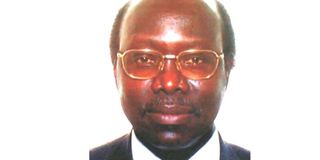Reflections on unworthy Covid-19 awards

Harold Acemah
What you need to know:
- Appointments not based on meritocracy can negatively affect service delivery.
Uganda never ceases to amaze, amuse and offend in almost equal measure. My attention was drawn recently by a friend to a story published in Saturday Vision of August 14 titled, ‘Dr Atwine receives award for fighting Covid-19’ which has sent shock waves to many Ugandans who have been following proceedings of the parliamentary taskforce on Covid-19, chaired by Bugweri County MP Abdu Katuntu, which has exposed rot, corruption and incompetence in the health sector.
According to the front page story, on August 12 the Ministry of Health permanent secretary, Dr Diana Atwine, received “an award for exceptional leadership in the fight against Covid-19” at an event held at Munyonyo, Kampala. It’s laughable and reads like a scene from a theatre of the absurd.
At the same event to mark International Youth Day, President Museveni was honoured with a similar award by “the office of Uganda’s ambassador for women and girls” a position I had never heard of until this month.
The ambassador, one Susan Nabuuma, is quoted saying, “the President has demonstrated the courage and heart to save Ugandans amidst the pandemic” which contradicts what Sabalwanyi told Ugandans publicly in Masindi District on January 26, 2017.
In the traditional Public Service which I had the honour and pleasure to be part of for more than 30 years, appointments to the position of permanent secretary are strictly on merit and reserved for career civil servants who have obtained the necessary minimum academic qualifications and have acquired vast experience over 20 years.
According to a 2018 book titled, Uganda’s Health Sector through Turbulent Politics: (1958-2018) by renowned health expert, Prof Anthony Mbonye (RIP), Ms Atwine did not possess adequate expertise and necessary experience to occupy the high position of permanent secretary at the time of appointment.
Prof Mbonye laments in his book that since 2010 the critical health sector has been managed (more like mismanaged) by junior and inexperienced officers appointed to influential and top positions on dubious grounds. The same can be said of the Foreign Service and most government ministries, departments and authorities.
Appointments to senior positions which are not based on meritocracy can negatively affect service delivery; as Prof Mbonye argues in his book, it does so in two ways; first, “the immediate effect has been on the demoralisation of staff who feel that the institutional mechanism to advance their professional careers is no longer relevant.”
Second and fundamentally, “because the staff occupying senior political and management positions lack the requisite knowledge and the experience to apply standard rules, regulations and procedures, which has negatively impacted service delivery.”
The same is happening in the Foreign Service which I am quite familiar with. Diplomacy is a profession just like the medical and legal professions; not every Tom, Dick and Harry is suitable for appointment as ambassador and carrying that distinguished title does not automatically and instantly make a person a competent, effective, efficient and productive representative of Uganda abroad. It’s a fallacy which must be stopped urgently for the sake of good governance and in order to advance Uganda’s national interests abroad.
Sometimes one gets the impression that the corrupt, decadent and incompetent NRM regime is trying to apply or implement literally the biblical saying that, “many who are first will be last, and many who are last will be first” but, with all due respect, Ms Atwine is unsuitable to be permanent secretary, especially of the key Ministry of Health on which more than 40 million Ugandans depend for healthy living. May God save Uganda!
Mr Acemah is a political scientist and retired career diplomat.
[email protected]




